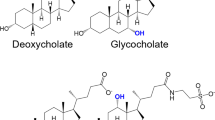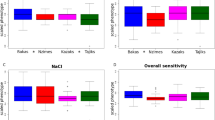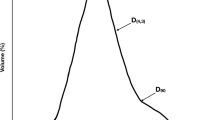Abstract
TASTE thresholds for the bitter substance PTC (phenylthiourea or phenylthiocarbamide) and related compounds containing the grouping  (HNCS)showa bimodal distribution, leading to the designation ‘tasters’ for the more sensitive individuals and ‘non-tasters’ or ‘taste blind’ for the less sensitive. Genetic and population studies have generally attributed this to a simple Mendelian dominance system in humans, non-human primates and some rodent species. All other bitter and non-bitter compounds tested so far have produced Gaussian distributions of thresholds1,2. We have found now, however, that sensitivity to the taste of PTC predicts sensitivity to caffeine, a common bitter substance that lacks the HNCS grouping. This was shown by threshold measurements and magnitude estimation of supra-threshold concentrations.
(HNCS)showa bimodal distribution, leading to the designation ‘tasters’ for the more sensitive individuals and ‘non-tasters’ or ‘taste blind’ for the less sensitive. Genetic and population studies have generally attributed this to a simple Mendelian dominance system in humans, non-human primates and some rodent species. All other bitter and non-bitter compounds tested so far have produced Gaussian distributions of thresholds1,2. We have found now, however, that sensitivity to the taste of PTC predicts sensitivity to caffeine, a common bitter substance that lacks the HNCS grouping. This was shown by threshold measurements and magnitude estimation of supra-threshold concentrations.
This is a preview of subscription content, access via your institution
Access options
Subscribe to this journal
Receive 51 print issues and online access
$199.00 per year
only $3.90 per issue
Buy this article
- Purchase on Springer Link
- Instant access to full article PDF
Prices may be subject to local taxes which are calculated during checkout
Similar content being viewed by others
References
Fischer, R., in The Chemical Senses and Nutrition (edit. by Kare, M. R., and Mailer, O.), 61–81 (Johns Hopkins University Press, Baltimore, 1967).
Klein, T. W., and De Fries, J. C., Nature, 225, 555 (1970).
Harris, H., and Kalmus, H., Ann. Eugen., 15, 24–31 (1949).
McBurney, D. H., and Pfaffmann, C., J. exp. Psychol., 65, 523–529 (1963).
Stevens, S. S., Percept. Psychophys., 6, 302–308 (1969).
Stevens, S. S., J. acoust. Soc. Am., 39, 725–735 (1966).
Beidler, L. M., and Gross, G. W. in Contributions to Sensory Physiology (edit. by Neff, W. D.), 5, 97–127 (Academic, New York, 1971).
McBurney, D. H., Smith, D. V., and Shick, T. R., Percept. Psychophys., 11, 228–232 (1972).
Smith, D. V., and McBurney, D. H., J. exp. Psychol., 80, 101–105 (1969).
McBurney, D. H., Percept. Psychophys., 11, 225–227 (1972).
Pfaffmann, C., J. Neurophysiol., 18, 429–440 (1955).
Ericksen, R. P. in Olfaction and Taste (edit. by Zotterman, Y.), 1, 205–213 (Pergamon, New York, 1963).
Fox, A. L., Proc. natn. Acad. Sci. U.S.A., 18, 115–120 (1932).
Salmon, T. N., and Blakeslee, A. F., Proc. natn. Acad. Sci. U.S.A., 21, 78–90 (1935).
Cohen, J., and Ogdon, D. P., Science, 110, 532–533 (1949).
Fischer, R., and Griffin, F., Drug. Res., 14, 673–686 (1964).
Ritchie, J. M., in The Pharmacological Basis of Therapeutics (edit. by Goodman, L. S., and Oilman, A.), 358–370 (Macmillan, New York, 1970).
Author information
Authors and Affiliations
Rights and permissions
About this article
Cite this article
HALL, M., BARTOSHUK, L., CAIN, W. et al. PTC taste blindness and the taste of caffeine. Nature 253, 442–443 (1975). https://doi.org/10.1038/253442a0
Received:
Revised:
Issue Date:
DOI: https://doi.org/10.1038/253442a0
This article is cited by
-
Detection thresholds for quinine, PTC, and PROP measured using taste strips
European Archives of Oto-Rhino-Laryngology (2019)
-
Differential Perception of Caffeine Bitter Taste Depending on Smoking Status
Chemosensory Perception (2014)
-
Gustatory Discriminative Norms for Caffeine in Normal Use Point to Supertasters, Tasters and Non-tasters
Chemosensory Perception (2011)
-
Reliability of Threshold and Suprathreshold Methods for Taste Phenotyping: Characterization with PROP and Sodium Chloride
Chemosensory Perception (2009)
-
Modeling the human PTC bitter-taste receptor interactions with bitter tastants
Journal of Molecular Modeling (2006)
Comments
By submitting a comment you agree to abide by our Terms and Community Guidelines. If you find something abusive or that does not comply with our terms or guidelines please flag it as inappropriate.



